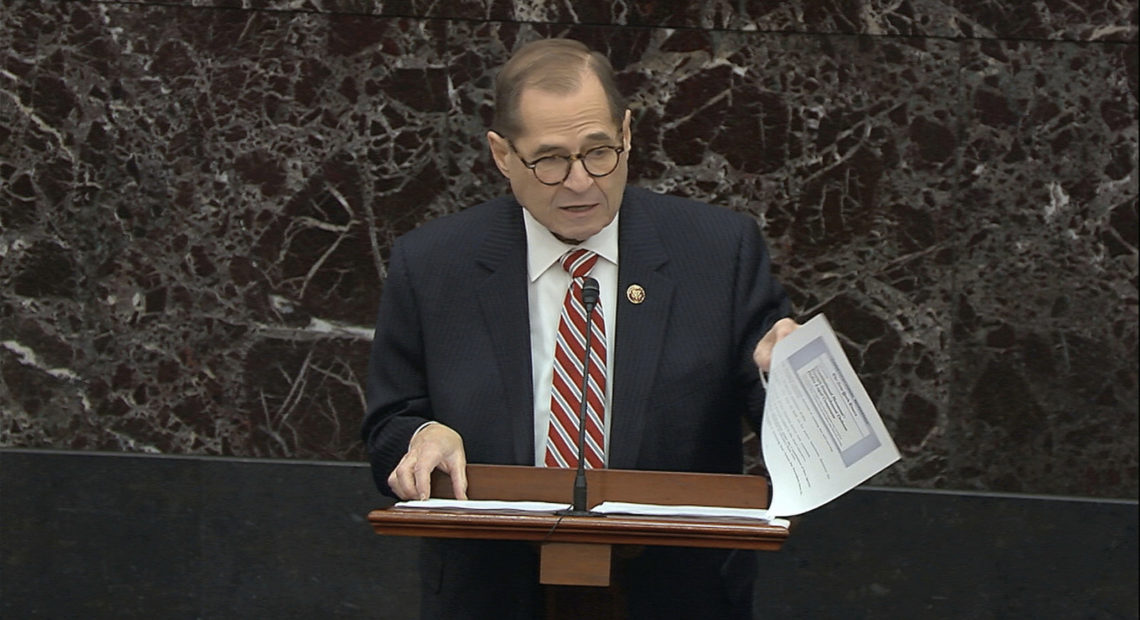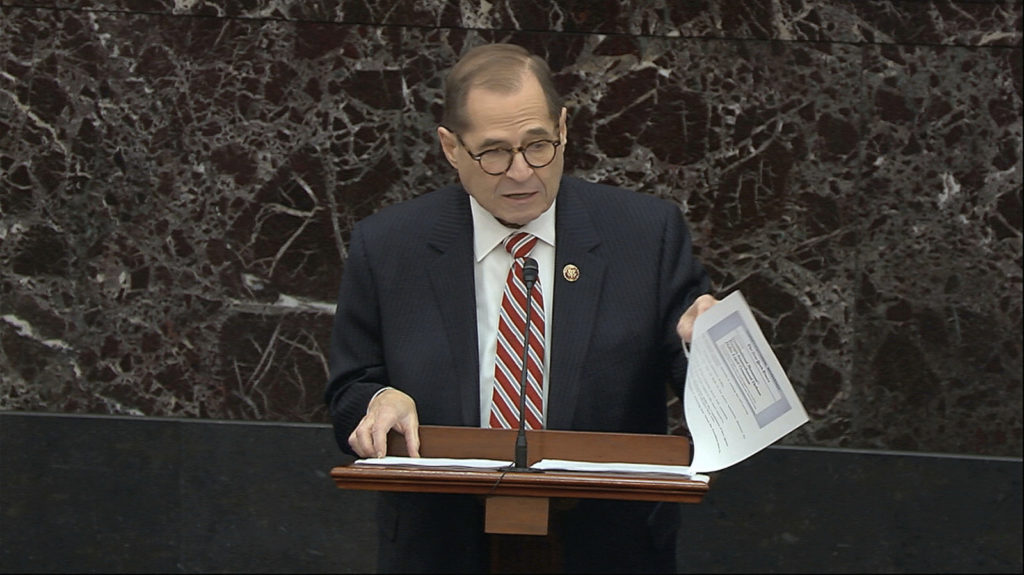
Day 3 Recap: Democratic Impeachment Managers Continue Making Their Case
NOTE: The impeachment trial continues Friday, Jan. 24, 10 a.m. PT / 1 p.m. ET. Watch live here.
BY PHILIP EWING
Congress has the power to impeach and remove a president over conduct that may not violate black-letter law — and President Trump’s actions qualify, House Democratic impeachment managers argued Thursday.
The Constitution doesn’t specify that a president must technically have broken a law in order to be impeached, said Rep. Jerry Nadler, D-N.Y., although Democrats also underscored that Trump did break at least one law in the Ukraine affair.
All the same, the framers of the Constitution clearly intended to give discretion to the House and the Senate about impeachment so they would not be circumscribed in holding a president accountable, Nadler said.

House impeachment manager Rep. Jerrold Nadler, D-N.Y., laid out what he called the legal theory for impeachment as the House is pursuing it. CREDIT: AP
“Abuse of power is clearly an impeachable offense under the Constitution. To be honest, this should not be a controversial statement,” Nadler said. “I find it amazing that the president rejects it. Yet he does.”
Accordingly Democrats evidently felt they had to make that aspect of their case clear as they continued their arguments against Trump into a second day.
Nadler, chairman of the House Judiciary Committee, laid out what he called the legal theory for impeachment as the House is pursuing it. Then his compatriots detailed why they believed Trump’s actions in the Ukraine affair last year had been for his own benefit, not that of the nation.
Another impeachment manager, Rep. Zoe Lofgren, D-Calif., observed later in the evening that Trump had broken the law in the Ukraine affair, as the Government Accountability Office concluded this month.
The articles of impeachment passed by the House don’t rely on that lawbreaking, she said, because it was simply part of what Democrats call a broader abuse of power by Trump.
“He simply didn’t care,” Lofgren said. “He didn’t care he was breaking the law.”
Trump dares Dems on witnesses
The president offered his own commentary on Twitter, including about a putative deal in which Republicans might agree to admit a witness such as former national security adviser John Bolton in exchange for one sought by Republicans — perhaps Hunter Biden, son of former Vice President Joe Biden.
Trump’s defense team is expected to begin its full response in the chamber on Saturday.
Other Republicans, including senators sitting in judgment of Trump and a few House lawmakers who’ve been deputized to handle the press for Trump during breaks in floor action, continued to fault Democrats’ arguments and the ongoing trial.
“That’s the safeguard”
Nadler opened his case on Thursday by quoting from framers of the Constitution reassuring their contemporaries about the then-new presidency of the then-new United States.
Among other things, they said, per Nadler, impeachment would ensure that no chief executive could escape accountability by committing transgressions more nebulous than those defined crisply by criminal law.
The Democrats don’t want a Witness Trade because Shifty Schiff, the Biden’s, the fake Whistleblower(& his lawyer), the second Whistleblower (who vanished after I released the Transcripts), the so-called “informer”, & many other Democrat disasters, would be a BIG problem for them!
— Donald J. Trump (@realDonaldTrump) January 23, 2020
Indeed, as Nadler argued, the United States didn’t have a formal statute for “bribery,” one of the crimes delineated by the Constitution that could trigger impeachment, until decades after its adoption. And, he said, even though the criminal code today is well established — Trump is effectively immune from it.
The Justice Department has opined, in a lesson retaught by the Russia investigation, that prosecutors cannot indict the president.
Nadler read a quote he said was from Attorney General William Barr, whom he said accepted the limitation on accountability for presidents: “That’s OK, because they can be impeached … that’s the safeguard.”
Nadler then invoked other supporters of Trump to aid his argument. He played a video clip from law professor Alan Dershowitz, who is on Trump’s defense team, and a video clip that featured someone sitting in his own audience: Sen. Lindsey Graham, R-S.C., who had been a House manager for the Clinton impeachment.
In the tape, a younger Graham was exploring the meaning of the Constitution’s definition of “high crimes and misdemeanors.”
“What’s a high crime? What about if an important person hurt somebody of low means? It’s not very scholarly but I think it’s the truth,” Graham said. “I think that’s what they meant by high crimes. Doesn’t have to be a ‘crime.’ It’s just when you start using your office and you’re acting in a way that hurts people.”
The Nixon precedent
Nadler then invoked other examples, including one involving President Richard Nixon, who was the subject of articles of impeachment in the House but who resigned before they were passed.
One key piece of evidence was a recording on which Nixon is overheard telling aides to get the CIA to lean on the FBI to quash the Watergate investigation.
That evidence, which became known as “the smoking gun,” was central to the loss of political support for Nixon and the certainty of his impeachment, Nadler said — but no law explicitly prohibited what the president was doing.
The technicality of a law wasn’t necessary, he argued, to make it plain to Americans, and most members of Congress, that Nixon’s actions were wrong and that his claim to office was forfeit.
Nadler urged senators to keep these examples in mind when Trump’s defenders argue that the president hasn’t been accused of breaking a law and accordingly can’t be impeached.
Not only has he broken one, as Lofgren later said, that’s not pertinent, Nadler argued.
“This view is completely wrong,” Nadler said. “It has no supporting congressional text … and it conflicts with every relevant consideration.”
Riding spinners
The other impeachment managers followed Nadler with a thesis more closely confined to the Ukraine affair: Trump conditioned official acts on the expectation of political favors by his Ukrainian counterpart, they argued.
Trump and Republicans argue that he didn’t do anything wrong. The military assistance for Ukraine that was frozen in 2019 was released, they observe — and Ukraine’s president didn’t commit to the political investigations Trump wanted.
Republicans reject Democrats’ “attempted extortion” metaphor and on Thursday they also counterattacked with a bit of opposition research:
Sen. Joni Ernst, R-Iowa, mocked the Democrats for getting on their “high horse” about Ukraine assistance when, she said, some of the managers had opposed legislation supporting it in the House.
Mostly, Thursday appeared to proceed in the way that Wednesday had: The 100 members of the Senate are confined to the chamber and its environs and may not have their cellphones.
They focused on their notes. They quaffed milk. Republican members were offered fidget spinners by Sen. Richard Burr of North Carolina — an unsubtle commentary about how captivating they considered the Democrats’ presentations.
A few spinners were visible on senators’ desks and at least one, Sen. Tom Cotton, R-Ark., toyed with his during remarks by Rep. Adam Schiff, D-Calif.
Senators also got into a rhythm of standing and stretching and milling around in the back of the chamber and its cloakrooms. Much of that activity appeared to take place roughly around 10 minutes before the hour, when the members were prompted by their fitness trackers.
NPR reporters Brakkton Booker and Kelsey Snell contributed to this report.
Copyright 2020 NPR. To see more, visit npr.org















